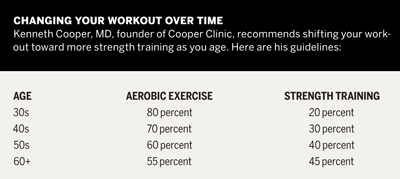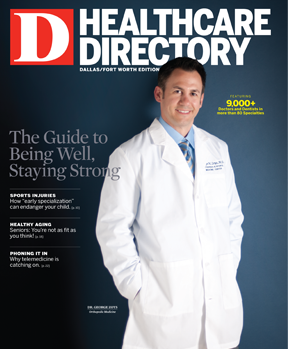Mental Fitness, Genetics
Researchers, including those at Cooper, have focused on dementia. That coincides with an increasing fear of losing mental faculties. A 2011 British poll found that more people fear dementia (31 percent) than cancer (27 percent) or death (18 percent).
The Cooper Institute, Cooper Clinic, and UTSW researchers found that the most fit middle-age adults are much less likely to develop dementia in their senior years than those who are the least fit at midlife. The study was published in the Annals of Internal Medicine in February.
The researchers divided the participants into those who were most and least fit, defined as the amount of time people ran on a treadmill. The fittest subjects ran the equivalent of a seven-minute mile during the treadmill test, while the least fit jogged the equivalent of a 12-minute mile.

Encouragingly, research shows more than half of all Alzheimer’s disease cases could potentially be prevented through lifestyle changes and treatment or prevention of chronic medical conditions.
Nina Radford, MD, director of clinical research and a cardiologist at Cooper Clinic, cautioned that research shows even highly conditioned people “can’t outrun genetics.” She suggests screening 10 years prior to the age a relative acquired a condition. “If your father had colon cancer at 50, start screening at 40. If he had a heart attack at 50, start monitoring risk factors at 40,” she says.
Radford said she has been incorporating sleep history into physical examinations more frequently. Sleep deprivation has been associated with weight gain, weakened immunity, and impaired cognition. She said the percentage of working-age adults who do not sleep seven or eight hours a night has risen from 10 percent to 40 percent since the 1970s.
Ben Levine, director of the Institute for Exercise and Environmental Science at Texas Health Presbyterian Dallas and professor of medicine and cardiology at UT Southwestern, underscored the harm of inactivity. He cited research at UT Southwestern in the 1960s that committed five men in their 20s to three weeks of bed rest. Researchers brought the same five men together 30 years later and found that 30 years of aging had less of a negative effect than the three weeks in bed three decades earlier.
Levine said he has unpublished research that shows exercising vigorously four to five times a week for 20 years during middle age prevents atrophy of the heart muscle nearly as well as being a master athlete who exercises six to seven times a week and competes.
Higher Healthcare Costs
Healthcare is a major retirement expense, and rising at a significantly higher rate than consumer inflation. According to Fidelity Investments, healthcare expenses for those 65 or older rose more than 4 percent in 2010, compared with 1.1 percent for consumer prices overall. Retirees are paying 56 percent more for medical expenses than in 2002. Healthcare expenses average $535 a month, second only to food.
The Center for Retirement Research at Boston College estimates that a married couple age 65 will spend $197,000 out of pocket for their remaining life expectancy. The figure rises to $260,000 when nursing care is included.
The Cooper Institute team is about to publish a study showing that higher levels of fitness at age 50 translate to lower annual healthcare costs at age 75. The institute is also looking at whether there is an independent benefit to fitness when people already have chronic conditions.
When it comes to healthy aging, DeFina says she often likes to quote the institute’s founder, Dr. Cooper: “It is easier to maintain good health than to regain it once it’s lost.”





